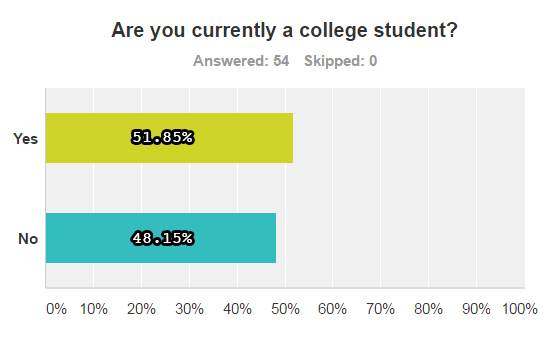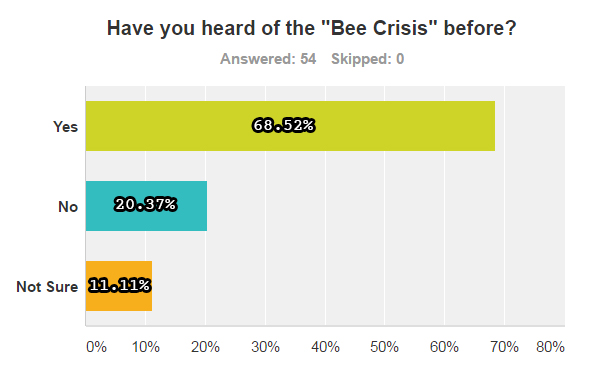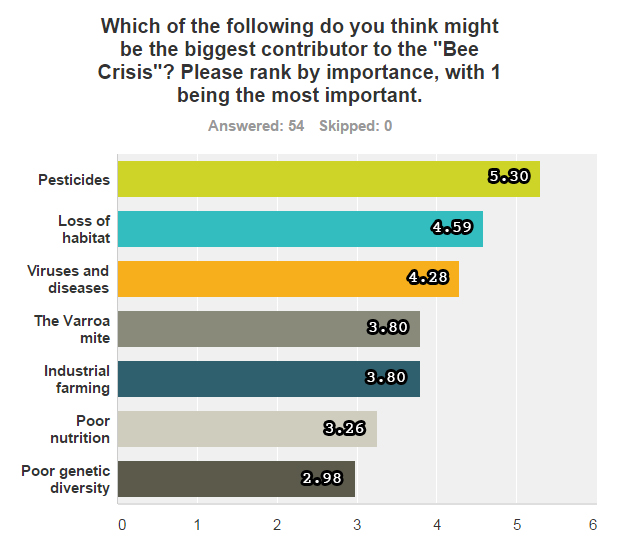Introduction
For my primary research, I started by writing a research question: “How familiar is the public with the media-dubbed “Bee Crisis” and what do they think is the most likely cause of it?”
I decided that a survey would be the best way to answer my research question.
I used Survey Monkey to design and conduct a survey that received a total of 54 responses. I designed the survey to be short and easy to take, with a total of seven required questions and one optional comment box.
The participants of my survey were mainly recruited using a select few subreddits: Sample Size (/r/SampleSize) and the San Francisco State University’s subreddit (/r/SFSU). I also forwarded the survey to some acquaintances I was familiar with. I made sure that the acquaintances I sent the survey to had not read my website about the “Bee Crisis,” so I was sure to get an unbiased opinion not tainted by my website.
I staggered out the advertising of my survey on the aforementioned subreddits so that I would generally know where participants were coming from.
Demographics
What is your age?

Question 1
I first asked what the participant’s age was. A staggering amount of the participants said they belonged to the 21-29 age bracket. Not surprising considering where I wrangled most of my participants from. The other 58.5% of participants were spread out somewhat evenly between the rest of the age brackets.
Are you currently a college student?

Question 2
I then asked whether the participant was a college student or not. Over half of the participants identified themselves as college students. Again, the results of this question are not too surprising.
Questions Regarding Familiarity
Have you heard of the “Bee Crisis” before?

Question 3
Over 68% of participants had heard of the “Bee Crisis” before.
Have you heard of Colony Collapse Disorder (CCD)?

Question 4
Less than half of the participants had heard of Colony Collapse Disorder (CCD), however.
I asked these two questions to determine which of the two terms was more popular. The two terms are interlinked. While the media-dubbed “Bee Crisis” describes the massive loss of bees in general, CCD describes a particular phenomenon which is part of the “Bee Crisis.” According to the EPA, CCD is “… the phenomenon that occurs when the majority of worker bees in a colony disappear and leave behind a queen, plenty of food and a few nurse bees to care for the remaining immature bees and the queen.” Hives that suffer from CCD typically do not survive the winter (“Colony Collapse Disorder”).
The “Bee Crisis” was the more well-known term, probably due to its heavy use in the media.
How would you rate your knowledge?

Question 5
Participants were then asked to rate their knowledge of the “Bee Crisis” on a scale of one to ten.
Most participants rated their knowledge as average. Participants also tended to rate their knowledge as poor. Only 3.70% of participants rated their knowledge as excellent. Ratings of six and onwards made for a combined 31.47% of participants.
Participants therefore felt more comfortable rating their knowledge of the “Bee Crisis” as average and below.
Which components have you heard of?

Question 6
The last question regarding familiarity asked participants which components of the “Bee Crisis” they had heard of. I included components of the “Bee Crisis” that were the most discussed throughout the media.
To avoid any sort of bias, I made the question randomize the order of the first seven options. I also allowed participants to select multiple options.
Notably, most of the options are related to each other in some way. For example: pesticides are used in industrial farming, industrial farming can lead to loss of habitat, loss of habitat can lead to poor nutrition, etc.
Pesticides was the most commonly selected option, followed by loss of habitat, viruses and diseases, industrial farming, the Varroa mite, poor genetic diversity, poor nutrition, and none of the above. In my opinion, these results probably reflect what the mass media most commonly reports on.
Questions Regarding Opinion
Which do you think might be the biggest contributor?

Question 7
I designed this question to reflect the format of the last question I asked concerning components of the “Bee Crisis.” The options were the same (except for the irrelevant “None of the above” option) and were again randomized.
This time, I asked the participants to rank the components by importance (with a ranking of one being the most important).
As seen in the above chart, pesticides were rated the biggest contributor to the “Bee Crisis.” Poor genetic diversity was rated the least important contributor.
Comparing this chart to the last question’s chart, you can see an interesting pattern emerging. Participants ranked the components that they were most familiar with higher than ones they weren’t familiar with.
The Comment Box
The last question of the survey was an optional comment box where participants could express any thoughts they may have about the “Bee Crisis” or the survey itself. I received several comments, but two of the comments stood out—I felt it would be interesting to include them in this post.
One participant noted a possible contributor to the “Bee Crisis” that I failed to include in the survey: “Also invasive species of non-native bees are a problem from what I read.” I was not aware of this possible component to the “Bee Crisis.”
Another participant showcased the other side of the spectrum: “There is no bee crisis. It is just another made up eco-scare.” This is an interesting opinion. How exactly is the “Bee Crisis” an eco-scare? I wish the participant had further elucidated on their opinion, because at this point I can only guess as to why he feels that it is not real.
A Basic Correlation Made from the Collected Data

Question 7: College Students vs. Non-students
Interestingly enough, college students and non-students ranked the importance of components in the “Bee Crisis” in a dissimilar manner. Pesticides is the only component that scored similarly between the two groups.
Because the number of college students outnumbered the non-students, their opinion slightly dominated the survey when the results were combined. You can see that by comparing the College Students graph to the previously discussed graph, which I’ll show again here for convenience.

The combined graph previously shown as Question 7.
Conclusion
I found that the participants of my survey were more familiar with the “Bee Crisis” term used by the mass media. The participants were more familiar with pesticides being a cause of the “Bee Crisis” and overall did not consider themselves very familiar with the “Bee Crisis.” My survey only had 54 participants, which is a small sampling of the public. By correlation, I would say that the mass media heavily affects what the public pay attention to and how much the public knows about current events.
Works Cited
“Colony Collapse Disorder.” EPA. Environmental Protection Agency, n.d. Web. 07 Nov. 2016.
I loved this primary research! The survey on monkey SurveyMonkey was such a great idea, not only did it spread the word about the bee crisis but also informed others. It is great what you can learn from others.
LikeLike
I really like this post. There is SO much information but yet it is SO understandable and easy to swallow! The graphs are nice and colorful and easy to understand. And despite all the numerical data, it’s explained so clearly. The writing style is neat and concise. And I really really like the topic chosen here too. #savethebees
LikeLike
This primary research was very well done. It went very in depth and the visual appeal and aid of the charts really helped understand the results more clearly. Not only did you gain public outlook, but you also spread awareness.
LikeLike
I enjoyed reading your post and learning about this issue of the bee crisis and peoples reaction to it. The images that you posted were helpful and informative. Overall, this was an awesome post!
LikeLike
This post contains a lot of information, yet it was very straightforward! The multiple points of entry made it easy for me to jump around from question to question. It was interesting to see how many people had not heard of the Bee Crisis. Great work!
LikeLike